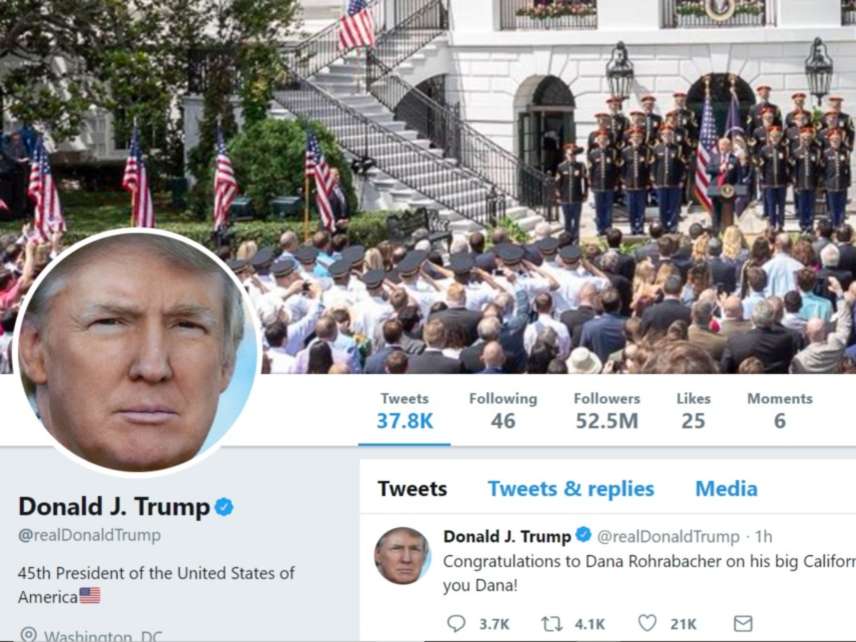Telling Trump to Stop Blocking Critics on Twitter Doesn't Affect the Platform's Rules
The First Amendment constrains speech regulation by the government, not by private parties.

Harvard law professor Noah Feldman worries that the recent First Amendment ruling against Donald Trump's blocking of critics on Twitter could ultimately result in legal restrictions on the ability of social media companies to exclude users or regulate their speech. "This is the first time, to my knowledge, that the First Amendment has ever been applied to a private platform," Feldman writes in a New York Times op-ed piece. He warns that "applying the First Amendment to social media will make it harder or even impossible for the platforms to limit fake news, online harassment and hate speech—precisely the serious social ills that the world is calling on them to address."
Feldman argues that "social media should not become a pure free-speech zone," that "the speech-based online abuses of our age need to be addressed not by the government but by the platforms on which they occur," that "the platforms' free-speech rights impose moral obligations on them," and that "the free market will ensure that the platforms do their best to comply." I agree with pretty much all of that, but I don't agree that the Twitter decision, properly understood, poses a threat to those principles.
U.S. District Judge Naomi Reice Buchwald's May 23 ruling against Trump was not, in fact, the first time a public official has been rebuked for violating the First Amendment by excluding people from a social media account because of the opinions they expressed. Last July, for instance, a federal judge in Virginia, James Cacheris, concluded that Phyllis Randall, chair of the Loudon County Board of Supervisors, had violated a local gadfly's First Amendment rights by banning him from her Facebook page after he posted a comment suggesting that members of the county school board had taken official actions that benefited their relatives. After that ruling, Maryland Gov. Larry Hogan decided to settle a lawsuit by visitors to his Facebook page who complained that his office had deleted their comments and blocked them from posting because they had brought up a touchy subject by urging Hogan to criticize Trump's ban on travelers from seven Muslim-majority countries.
In all three cases, elected officials used their social media accounts to conduct government business and presented them as conduits for communicating with their constituents while inviting responses from the general public. By doing so, the plaintiffs argued, the officials had created designated public forums, which cannot constitutionally discriminate against people based on their views. The lawsuits accused government officials, not Twitter or Facebook, of violating the First Amendment, which does not constrain private parties and in fact gives them a right to decide which speech will be allowed on their platforms. A similar analysis would apply to a town meeting in a rented hall or a government website on servers owned by a private company.
Feldman nevertheless sees a threat of judicial control over speech regulation by social media companies. "It's not only people specifically blocked by President Trump's account who can't reply to him on Twitter," he notes. "It's also anyone excluded from Twitter by the platform itself, including those barred from Twitter for engaging in harassment or hate speech. Such parties may now sue Twitter, demanding access to the platform so they can post comments on Mr. Trump's account."
Anyone can sue anyone over anything, but that does not mean they can survive a motion to dismiss, let alone win. Buchwald's decision, like Cacheris's, focused on the actions of a government official; it said nothing about the supposed First Amendment obligations of a social media company. Loosely speaking, Buchwald affirmed a First Amendment right to follow the president on Twitter. But it would be more precise to say she affirmed a First Amendment right not to be blocked from the president's Twitter account (specifically, the "interactive space" associated with his tweets) by the president (or his underlings) because something you said offended him. Trump is appealing the decision but in the meantime seems to be complying with it by unblocking the plaintiffs.
"If President Trump was able to create a public forum on Twitter without Twitter's agreement to such a legal state of affairs," Feldman says, "then it becomes more plausible to think that Twitter itself is a public space, regardless of whether it intends to be one." Only if you ignore the crucial distinction between government action and private action when applying a constitutional provision that is explicitly aimed at the former. So far there is no evidence that the federal courts are inclined to do that.


Show Comments (47)